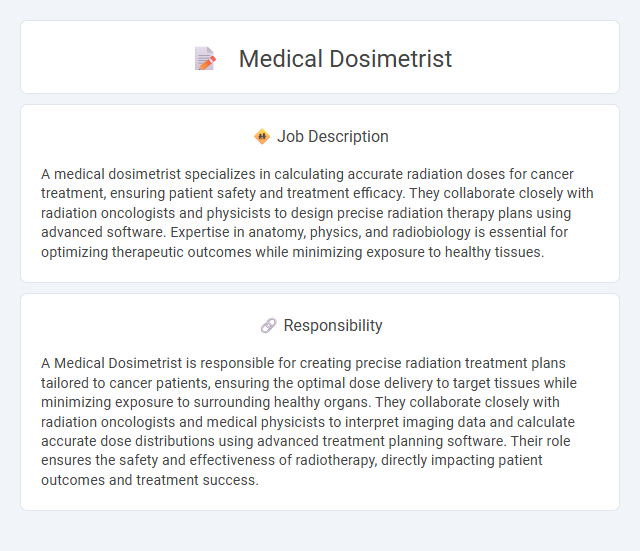
A medical dosimetrist specializes in calculating accurate radiation doses for cancer treatment, ensuring patient safety and treatment efficacy. They collaborate closely with radiation oncologists and physicists to design precise radiation therapy plans using advanced software. Expertise in anatomy, physics, and radiobiology is essential for optimizing therapeutic outcomes while minimizing exposure to healthy tissues.
Individuals with strong analytical skills and attention to detail are likely well-suited for a medical dosimetrist role. Those who can comfortably work with complex medical data and have a passion for helping patients through cancer treatment may find this job fulfilling. It is probable that people who prefer routine and precision over high-pressure decision-making will adapt better to this profession.
Qualification
Medical dosimetrists must possess a bachelor's degree in radiation therapy, medical dosimetry, or a related field, often accompanied by certification from the Medical Dosimetrist Certification Board (MDCB). Proficiency in treatment planning software, understanding of radiation safety protocols, and strong knowledge of anatomy and radiation physics are essential qualifications. Clinical experience through internships or supervised training enhances the ability to create precise radiation dose plans for cancer patients.
Responsibility
A Medical Dosimetrist is responsible for creating precise radiation treatment plans tailored to cancer patients, ensuring the optimal dose delivery to target tissues while minimizing exposure to surrounding healthy organs. They collaborate closely with radiation oncologists and medical physicists to interpret imaging data and calculate accurate dose distributions using advanced treatment planning software. Their role ensures the safety and effectiveness of radiotherapy, directly impacting patient outcomes and treatment success.
Benefit
A career as a medical dosimetrist may offer competitive salaries and comprehensive benefits packages, including health insurance and retirement plans. Opportunities for professional development and certification could enhance job security and career progression. The role often provides a meaningful contribution to patient care, which may increase job satisfaction.
Challenge
Medical dosimetrists likely face significant challenges in accurately calculating radiation doses for cancer treatment while ensuring patient safety. The complexity of varying tumor types and patient-specific anatomy may increase the difficulty in optimizing treatment plans. Balancing precision and efficiency could remain a constant challenge throughout their work.
Career Advancement
Medical dosimetrists play a crucial role in radiation therapy by developing precise treatment plans to ensure accurate radiation doses for cancer patients. Career advancement often involves gaining additional certifications such as Certified Medical Dosimetrist (CMD) and pursuing specialized training in advanced treatment technologies like IMRT and stereotactic radiosurgery. Opportunities for growth include transitioning into supervisory roles, clinical research, or education within oncology treatment centers and healthcare institutions.
 kuljobs.com
kuljobs.com